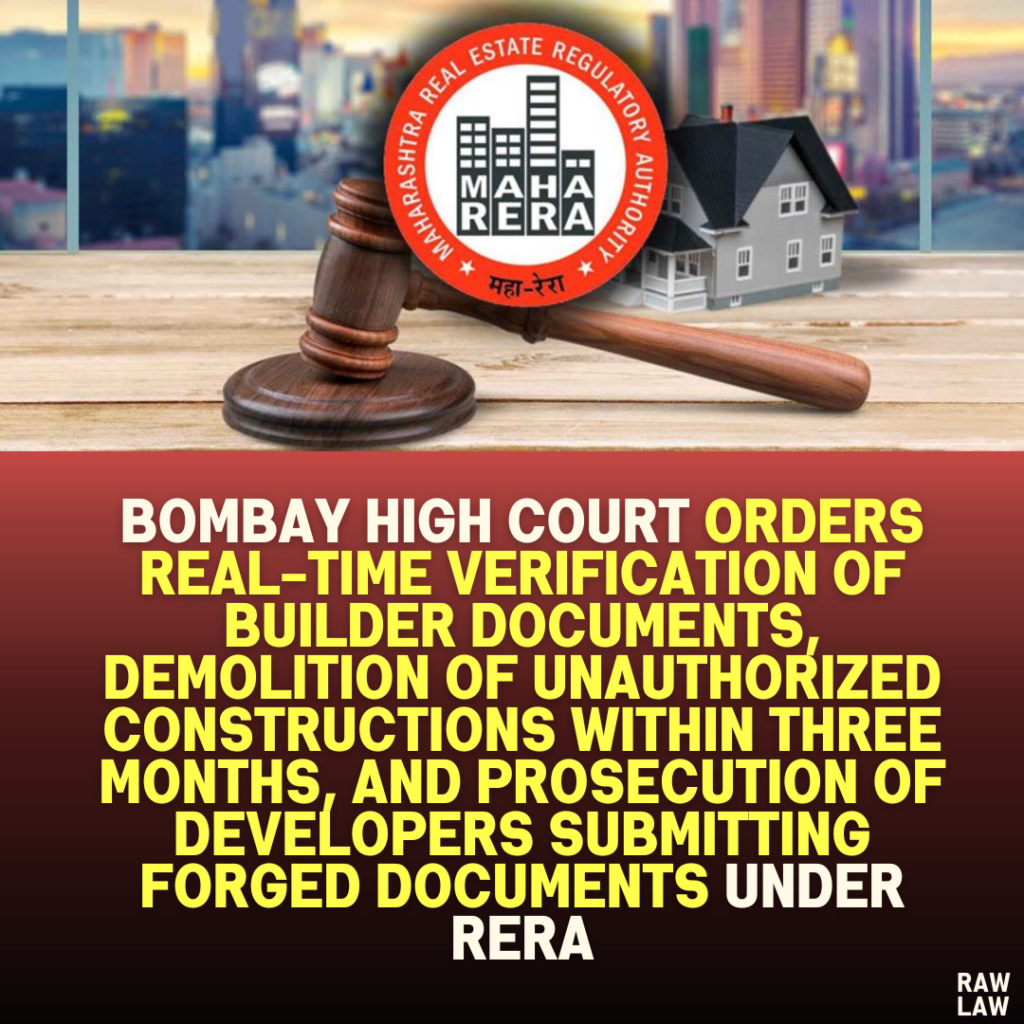Court’s Decision:
The Bombay High Court directed the State Government, MahaRERA, and municipal authorities to implement real-time verification systems for project documents to curb fraudulent practices under the Real Estate (Regulation and Development) Act, 2016 (RERA). The Court emphasized the need for enhanced compliance, accountability, and transparency in project registrations to protect homebuyers.
Facts of the Case:
The PIL raised concerns about unauthorized constructions and fraudulent project registrations in Kalyan and Ambarnath regions of Thane District. It alleged that developers submitted forged commencement and occupation certificates to secure approvals under RERA.
The petitioner pointed out systemic failures in document verification, citing over 27 villages affected by such unauthorized constructions. The issue of non-compliance with Government Resolutions mandating document scrutiny before granting approvals was highlighted as a major concern.
Issues:
- Whether current mechanisms under RERA are sufficient to address fraudulent registrations.
- Whether judicial intervention is necessary to mandate systemic reforms for transparency and accountability.
Petitioner’s Arguments:
- Regulatory Gaps:
- The petitioner argued that MahaRERA and municipal authorities failed to coordinate effectively, enabling developers to exploit regulatory loopholes.
- Highlighted the absence of real-time verification mechanisms for project documents.
- Consumer Protection:
- Emphasized that fraudulent registrations negatively impact homebuyers and undermine confidence in the real estate sector.
- Judicial Oversight:
- Urged the Court to direct systemic reforms to ensure statutory compliance and prevent further misuse of regulatory frameworks.
Respondent’s Arguments:
- Steps Taken:
- MahaRERA stated that efforts were underway to integrate municipal systems for real-time document verification.
- Noted that fraudulent project registrations had been revoked and developers prosecuted.
- Policy Implementation:
- Respondents highlighted ongoing efforts to comply with Government Resolutions requiring document scrutiny.
- Objection to Generalized Inquiry:
- Contended that the petitioner’s demand for statewide scrutiny was speculative and lacked specific evidence.
Court’s Analysis:
- Need for Transparency and Verification:
- The Court observed that systemic failures in document verification created opportunities for misuse, necessitating reforms.
- Limitations of Judicial Oversight:
- Declined to order a statewide inquiry but directed targeted measures to address identified gaps.
- Consumer Interests:
- Stressed the importance of robust compliance mechanisms to safeguard homebuyers and maintain public trust.
Conclusion:
The Court directed:
- Completion of digital integration between MahaRERA and municipal authorities for real-time document verification within three months.
- Demolition of unauthorized constructions and prosecution of developers submitting forged documents.
- Publication of all statutory documents related to real estate projects on public platforms to ensure transparency.
The PIL was disposed of, allowing aggrieved parties to seek remedies under Sections 7 and 11 of the RERA Act.




Pingback: Delhi High Court Quashes BSNL’s Rescission of Purchase Order: "Arbitration Clause Does Not Bar Article 226 Petition Alleging Arbitrariness by a Public Entity, Even in Contractual Disputes - Raw Law
Pingback: Delhi High Court Upholds Arbitral Award: "Petitioner’s Termination of Contract Invalid Due to Delays in Structural Drawings and Failure to Grant Extensions, Rendering Counterclaims Unjustified" - Raw Law